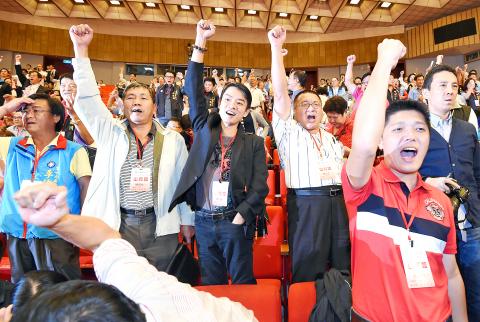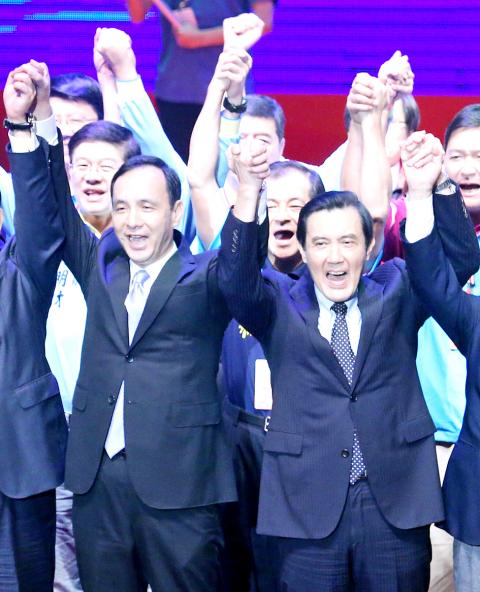Chinese Nationalist Party (KMT) Chairman Eric Chu (朱立倫) yesterday apologized to New Taipei City residents for breaking his promise to serve out his term as the municipality’s mayor after being endorsed by a KMT extempore congress to replace Deputy Legislative Speaker Hung Hsiu-chu (洪秀柱) as the party’s presidential candidate.
Following a landslide vote to rescind Hung’s candidacy, a majority of the 891 KMT representatives at the congress approved Chu’s nomination by standing up and applauding.
The congress authorized Chu to recommend a possible vice presidential candidate, whose nomination is then to be assessed by the party’s seven-person presidential nomination evaluation panel headed by KMT Vice Chairman Hau Lung-bin (郝龍斌).

Photo: CNA
Against the backdrop of party representatives chanting: “Eric Chu, winning the election” and “Go KMT,” Chu said it was with a solemn and heavy heart that he shouldered the expectations the public had for the party.
“Starting today [yesterday], we will adjust our pace and start afresh,” Chu said. “This critical moment might go down in history as a day of polarization for the KMT, but it could also be a time of solidarity.”
Chu said the reason he dared to accept the challenge in the KMT’s darkest hour was the same reason that prompted him to enter politics 17 years ago: to ensure a better world for future generations.

Photo: CNA
Chu said he had been reluctant to consider joining the Jan. 16 race because of the pledge he made to New Taipei City residents when he announced he would run for re-election as mayor in June last year and vowed to serve out a second term.
“Nevertheless, to safeguard the KMT’s reins of government and majority in the legislature, as well as the future of the public and the Republic of China [ROC] ... I must apologize to each New Taipei City resident who supports me,” Chu said.
“I want to tell every Taiwanese and resident of the city that I am doing this because I have to protect the ROC we love, the democratic politics we have fought to preserve and our healthy democracy of checks and balances,” he said.
Should the KMT become a minority party in the legislature or gain less than one-third of the legislative seats in the Jan. 16 elections — to be held alongside the presidential vote — no one can imagine what the Democratic Progressive Party (DPP) might do, Chu said.
Chu said that if the KMT fails to maintain its legislative majority, the nation’s future, as well as cross-strait peace could be jeopardized.
Challenging DPP presidential candidate Tsai Ing-wen (蔡英文) to a debate on cross-strait policies, Chu said Tsai should define the “status quo” she intended to maintain.
“Does her ‘status quo’ refer to the situation maintained by the KMT based on the [so-called] ‘1992 consensus’ or the one championed by President Ma Ying-jeou (馬英九) in accordance with his ‘three noes’ policy — no unification, no independence and no use of force,” Chu asked.
The “1992 consensus,” a term former Mainland Affairs Council chairman Su Chi (蘇起) admitted making up in 2000, refers to a tacit understanding between the KMT and the Chinese government that both sides acknowledge there is “one China,” with each side having its own interpretation of what “China” means.
Chu said he would push for the reinstatement of the legislature’s power to approve the premier appointed by the president as part of the KMT’s effort to promote a Cabinet system of government.
He also vowed to deliver a national report to the legislature each year.

Intelligence agents have recorded 510,000 instances of “controversial information” being spread online by the Chinese Communist Party (CCP) so far this year, the National Security Bureau (NSB) said in a report yesterday, as it warned of artificial intelligence (AI) being employed to generate destabilizing misinformation. The bureau submitted a written report to the Legislative Yuan in preparation for National Security Bureau Director-General Tsai Ming-yen’s (蔡明彥) appearance before the Foreign Affairs and National Defense Committee today. The CCP has been using cognitive warfare to divide Taiwanese society by commenting on controversial issues such as Taiwan Semiconductor Manufacturing Co’s (TSMC, 台積電) investments in the

INVESTIGATION: The case is the latest instance of a DPP figure being implicated in an espionage network accused of allegedly leaking information to Chinese intelligence Democratic Progressive Party (DPP) member Ho Jen-chieh (何仁傑) was detained and held incommunicado yesterday on suspicion of spying for China during his tenure as assistant to then-minister of foreign affairs Joseph Wu (吳釗燮). The Taipei District Prosecutors’ Office said Ho was implicated during its investigation into alleged spying activities by former Presidential Office consultant Wu Shang-yu (吳尚雨). Prosecutors said there is reason to believe Ho breached the National Security Act (國家安全法) by leaking classified Ministry of Foreign Affairs information to Chinese intelligence. Following interrogation, prosecutors petitioned the Taipei District Court to detain Ho, citing concerns over potential collusion or tampering of evidence. The

‘COMPREHENSIVE PLAN’: Lin Chia-lung said that the government was ready to talk about a variety of issues, including investment in and purchases from the US The National Stabilization Fund (NSF) yesterday announced that it would step in to staunch stock market losses for the ninth time in the nation’s history. An NSF board meeting, originally scheduled for Monday next week, was moved to yesterday after stocks plummeted in the wake of US President Donald Trump’s announcement of 32 percent tariffs on Taiwan on Wednesday last week. Board members voted to support the stock market with the NT$500 billion (US$15.15 billion) fund, with injections of funds to begin as soon as today. The NSF in 2000 injected NT$120 billion to stabilize stocks, the most ever. The lowest amount it

NEGOTIATIONS: Taiwan has good relations with Washington and the outlook for the negotiations looks promising, Minister of Economic Affairs J.W. Kuo said Taiwan’s GDP growth this year is expected to decrease by 0.43 to 1.61 percentage points due to the effects of US tariffs, National Development Council (NDC) Minister Paul Liu (劉鏡清) said at a meeting of the legislature’s Economics Committee in Taipei yesterday, citing a preliminary estimate by a private research institution. Taiwan’s economy would be significantly affected by the 32 percent “reciprocal” tariffs slapped by the US, which took effect yesterday, Liu said, adding that GDP growth could fall below 3 percent and potentially even dip below 2 percent to 1.53 percent this year. The council has commissioned another institution